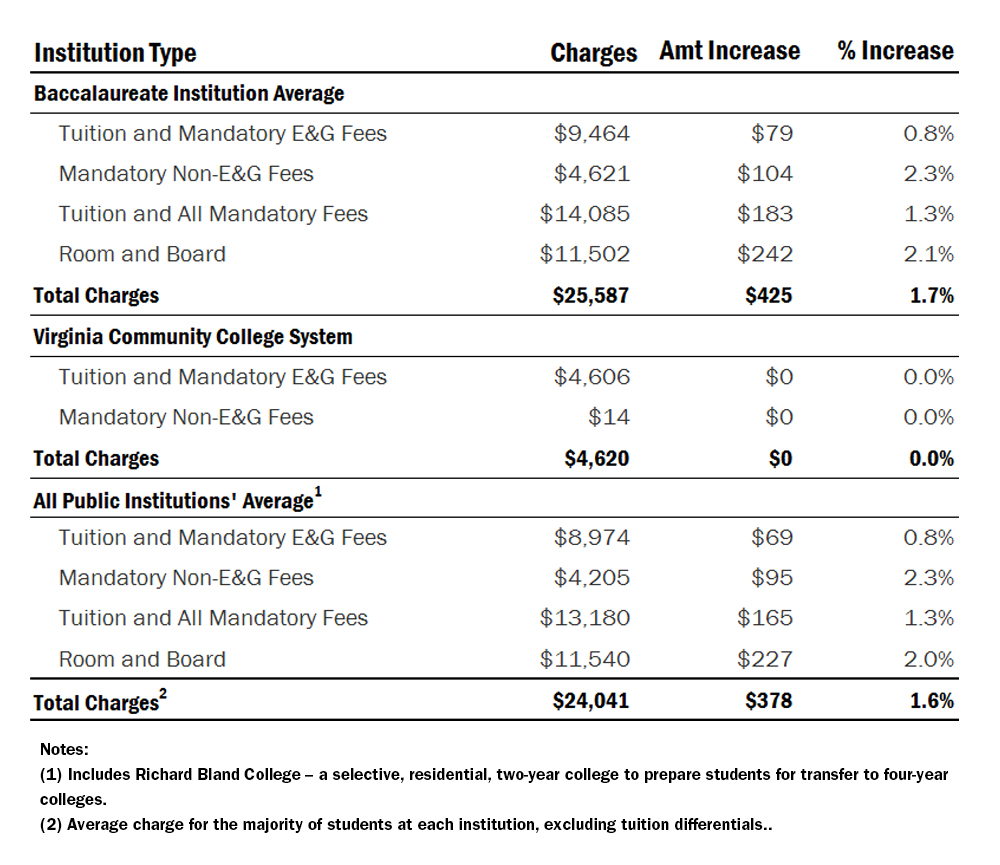FOR IMMEDIATE RELEASE
RICHMOND — Tuition and mandatory fees for the 2021-22 academic year at Virginia’s public higher education institutions remain largely unchanged from last year for the majority of in-state undergraduate students. As a result of the additional funding from the state and federal governments - and because of a commitment by colleges and universities to minimize the financial impact of COVID-19 - Virginia public institutions were able to contain the tuition increases in 2021 22 academic year, according to the annual Tuition & Fees Report from the State Council of Higher Education for Virginia (SCHEV).
BACKGROUND
Each year, public institutions of higher education in Virginia assess charges to students through tuition and fees. These charges are driven largely by increased costs, funding needs to improve or grow services, sensitivity to students’ ability to pay, and the amount of state support provided for in-state students. Costs and funding needs are both mandated and discretionary. Mandated cost increases can occur as a result of state-authorized raises for faculty and staff; benefit changes to areas such as health care; utility rate changes; and new debt and operational costs for facilities. Discretionary increases can include costs related to growth in services to students, new program and degree offerings and institution-authorized salary increases.
Costs at institutions are divided between those that relate to instruction (education and general—E&G) and those related to non-instruction (non-E&G). E&G costs include faculty and staff support for instruction, support services for students, operations and maintenance costs of instructional facilities and administrative support. Non-E&G costs can include athletics, recreational facilities, student health services, transportation on campus and debt service for non-instruction related buildings.
State funding for higher education is limited to E&G costs that support in-state students. The state currently funds about 50% of the calculated base cost of education for in-state students related to E&G costs. Once funding costs and needs are assessed and the institutions know the amount of state funding available, tuition and fees are determined by boards of visitors at each institution.
In FY 2022, in order to address the impact of the COVID-19 pandemic and concern about college access and affordability, the Commonwealth provided significant investments of approximately $258 million in additional general fund for higher education operations and financial aid in FY 2022. Of these funds, $73.5 million was set aside for affordable access; $40 million to support increased costs related to the pandemic; and $87 million for need-based financial aid. In addition, the federal government provided various kinds of stimulus packages of funding to higher education institutions. In total, public higher education in Virginia received approximately $1.5 billion in federal funds to support the effects of the pandemic from spring 2020 through 2023.
The State Council of Higher Education annually reports tuition and fee charges to the Governor and the chairs of the House Appropriations and Senate Finance and Appropriations Committees as outlined in Item 4-2.01.b.4.b of the Appropriation Act.
KEY FINDINGS
The following are key findings from the 2021-22 Tuition and Fees Report for in-state undergraduates.
- Institutions had the lowest annual increase since FY 2000 in tuition and instructional fees. Tuition and mandatory educational and general (E&G) fees (those fees related to instruction and supported by the state) increased by $69 (0.8%), the lowest annual increase since FY 2000 except in years when the legislature mandated a tuition freeze or tuition rollback.
- Eleven institutions did not increase tuition and mandatory E&G fees. This is largely due to concerns related to access and affordability, especially during the COVID-19 period, additional state and federal funding and recognition from boards of visitors to keep tuition low for students.
- State support for in-state undergraduate education increased. Due to recent years of state investment, Virginia undergraduate students will pay, on average, 50% of the costs related to education, while the state will provide 50%. This represents a one percentage point increase in state support from the prior year. SCHEV staff estimate that if the state funded at the level of the state’s cost-share policy (67%), tuition could be as much as $2,700 (34%) lower than current levels.
- Virginia’s in-state undergraduate total tuition and fee charges as a percentage of per-capita disposable income remain higher than the national average. Virginia’s rate is 45% compared to 42%.
- Total charges at baccalaureate institutions — the average sum of tuition, all mandatory fees and room and board — are $25,587. This is an increase of $425 (1.7%) for in-state undergraduate students, the lowest percentage increase since FY 2000.
- Affordable options to reduce the cost of higher education are available, including the use of through transfer, financial aid and scholarships. For example, students who complete an associate degree at a community college and transfer to a baccalaureate institution can save an average of $19,214 of the cost of a bachelor’s degree.
Chart 1: 2021-22 Full-Time In-State Undergraduate Total Charges

The full report and all SCHEV reports are available at schev.edu/reports.
###
Media resources including news advisories, logos and releases are available at www.schev.edu/media.
The State Council of Higher Education for Virginia is the state’s coordinating agency for higher education. With Pathways to Opportunity: The Virginia Plan for Higher Education, SCHEV is dedicated to making Virginia the best state for education by 2030. For more on this statewide strategic plan, visit schev.edu/TheVirginiaPlan.
